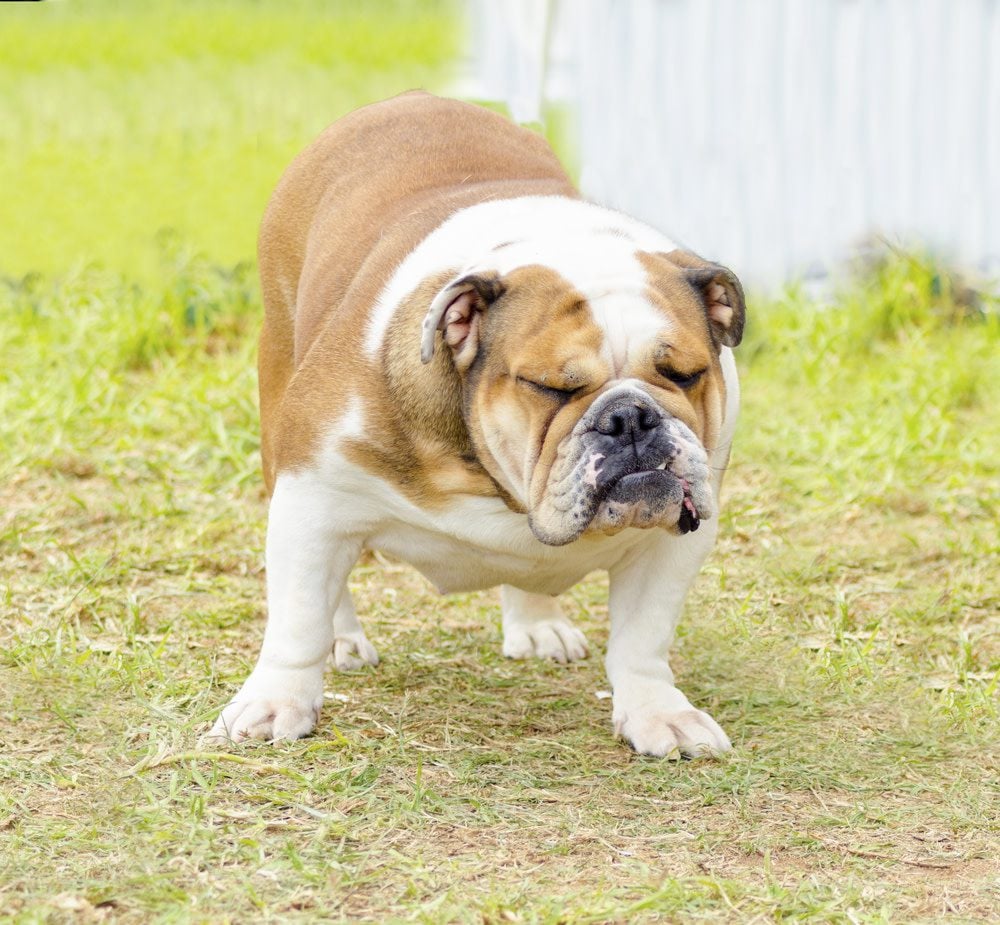12 Effective Home Remedies For Constipation In Dogs

Table of Contents
What Is Constipation in Dogs?
Constipation in dogs is a common health problem that occurs when the stools become hard and dry, making them difficult to pass. Constipated dogs strain to defecate and typically produce small, firm stools.
Sometimes, the feces are so dry that they break into pieces as the dog attempts to pass them. Occasionally, constipation can occur due to obstruction within the rectum or neurologic conditions that make defecation difficult.
Constipation is uncomfortable or even painful for your dog and can lead to other problems. It is important to work with your veterinarian to determine the underlying cause of the dry stools to provide proper treatment and prevention.
What Is the Difference Between Diarrhea and Constipation in Dogs?
Diarrhea in dogs is the production of large and frequent amounts of soft stool. Diarrhea results in liquid or semiliquid stool, often containing mucus and undigested food particles. The exact stool volume varies from one episode to another.
Constipation is the opposite of diarrhea. Instead, the dog produces small amounts of firm stool, typically straining to do so. The feces can cause pain as the dog tries to eliminate them.
What Causes Constipation in Dogs?

Constipation in dogs can be caused by stress, digestion issues, and other GI tract abnormalities. Here are some of the most common causes of constipation in dogs:
- Indigestion. Sudden changes in your dog’s diet may cause digestive problems. Usually, diarrhea is the most common consequence. However, once the diarrhea bout is over, the dog can develop constipation.
- Excessive or Low Fiber Intake. If your dog eats low-quality dog food that is not complete and balanced, it may experience constipation. Lack of fiber in the diet is a common cause of constipation in dogs. On the other hand, excessive fiber intake can create bulky stools that may be hard to pass.
- Stress. Dogs are susceptible to stress and can develop digestive problems under pressure. This is true if your pet is experiencing many changes in its environment, including moving to a new home or getting a new family member.
- Excessive Self-Grooming. Excess grooming can result in dog constipation if the dog licks and swallows too much hair that collects in the stool.
- Lack of Exercise. Dogs are highly active animals and require regular exercise. Inactivity can increase the chances of constipation, while increased activity can encourage healthy bowel movements.
- Dehydration. Dehydration causes the colon to absorb increased amounts of water from fecal matter, making it hard and dry.
- Obstruction. Intestinal obstruction can be caused by a mass or dog tumor that prevents the stool from effectively passing through the intestines and out of the rectum. The obstruction could also be due to a stricture (narrowing) of the rectum or colon.
- Enlarged Prostate. If enlarged, the prostate gland can cause difficulty urinating. This is more common than causing constipation, but constipation can occur if the prostate is blocking the rectum and making it difficult for a dog to pass stool. This is more common in males who are not neutered.
- Anal sac infections or impactions. An impacted or infected anal sac can become large or painful, possibly obstructing part of the anal opening or causing the dog to have difficulty defecating. Anal sacs can also develop tumors that contribute to constipation.
- Metabolic Diseases. Hormonal imbalances (hypothyroidism, hyperparathyroidism) and systemic issues (kidney problems) can contribute to constipation.
- Neurologic Conditions or Trauma: Injuries or conditions affecting the pelvis or spinal cord can affect neurologic input to the intestines or anal region, affecting the dog’s ability to defecate.
- Side effects of Medications. Some medications, such as diuretics, antihistamines, steroids, and antibiotics, can cause constipation in dogs.
What Are the Symptoms of a Constipated Dog?
If your dog is constipated, you will likely notice the following signs of constipation:
- Loss of appetite
- Painful defecation
- Straining during defecation
- Small, firm stools or no stools produced during defecation
- Scooting
- Lethargy
You may also see frank blood in the stool if the dog is straining excessively or has a very large, dry stool.
How Do I Know If My Dog Is Constipated?
Dogs can have many bowel movements ranging from soft to hard, small and round, or large and sausage-shaped.
But if your dog hasn’t had a bowel movement in more than three days, he may be constipated. If your dog is attempting to defecate but is instead having the signs listed above, this increases the likelihood that your pet is constipated.
What Is the Fastest Way to Relieve Constipation in Dogs?

If constipation is a new issue for your dog, it is a good idea to see your dog’s veterinarian to determine what the underlying cause is and develop a management plan.
If you have a chronically constipated dog, here are some natural, at-home remedies that can help your dog get relief from constipation:
Increase Water Intake (Hydration). Water is an important part of any dog’s diet. A good rule of thumb is that your dog should drink approximately 1 ounce of water for every pound of body weight. For example, a dog who weighs 15 pounds should drink around 15 ounces of water. If your dog isn’t drinking enough water, it will become dehydrated and constipated very quickly because they’re not getting the water they need to move waste through its system.
Increase Fiber Intake. Fiber is a complex carbohydrate in plants such as fruits, vegetables, grains, and legumes (beans). Appropriate levels of fiber help bulk up stool, making it softer and easier to pass through the colon. Dogs on a low-fiber diet may benefit from adding more fiber to their diet to help ease their symptoms of constipation. The best sources of fiber for dogs are fruits and vegetables since they also contain vitamins and minerals, which are beneficial for overall health and regular digestion. Excessive fiber can also cause diarrhea. Consult with your veterinarian if you are concerned about fiber in your pet’s diet.
Exercise Regularly. Exercise helps stimulate bowel movement in dogs. This includes walks around the neighborhood and playing fetch with a ball or Frisbee at home!
Use Probiotics. Probiotics are beneficial bacteria that keep the gut microbiome in check and help with digestion. Probiotics are safe for dogs of all ages and come in different forms, including powders or chewable treats. Probiotics can also be found in certain human foods that are safe for dogs, such as Greek yogurt and kefir.
Feed Pumpkin. You can give your dog canned pumpkin or pumpkin puree mixed in with their food or alone as a treat. The good news is that pumpkin is safe for dogs of all ages, so there’s no need to worry about giving it to your puppy.
Mineral Oil. Oils are natural laxatives. They coat and lubricate the intestinal tract, so everything can move along the digestive tract smoothly. If recommended by a veterinarian, you can mix mineral oil into his food. A little goes a long way. If you use mineral oil, start with drops and work up to a full teaspoon.
Aloe Vera. Aloe vera has been used for thousands of years as a natural, herbal remedy for many conditions and ailments. Dogs with constipation might benefit from drinking aloe vera juice on a regular basis. The dose is 1 teaspoon per 10 pounds of body weight per day. Aloe vera juice has been shown to increase bowel movements by up to 30%. If you use aloe vera juice for your dog, ensure you are purchasing a variety that does not contain harmful substances, such as the artificial substance xylitol.
Feed Your Dog Yogurt. Yogurt contains live cultures that are superb for your dog’s digestive system. Yogurt should be plain yogurt with no added sweeteners like xylitol. Yogurt should not be more than 10% of your pet’s total calories per day. You can give one teaspoon of yogurt per 10 pounds of body weight daily.
Apple Cider Vinegar. Apple cider vinegar can help relieve constipation. It is prebiotic, meaning it can help to promote healthy bacteria in the gastrointestinal tract. Some believe it may also help by stimulating the bowel muscles and increasing the amount of bile in the digestive tract. Mix ¼ to ½ teaspoon into the food or water bowl daily. Do not administer this directly into the mouth.
Fennel. Fennel has been used as a traditional treatment for constipation in humans and dogs due to its ability to stimulate intestinal motility, reduce spasms, and increase peristalsis (the wave-like muscle movements that push food through the digestive tract). Add one teaspoon of fennel seeds per cup of water and boil for 10 minutes until reduced by half. Then, strain out all solids before giving your dog 1/2-1 teaspoon every 12 hours as needed for relief.
Add Beet Juice to the Water Bowl. Beets contain a tonic that helps relieve constipation by increasing bile production in the liver and gallbladder. This stimulates bile flow from these organs into the intestines, stimulating intestinal contractions and increasing intestinal motility (the speed at which food moves through your dog’s digestive tract).
Add Ginger Root to the Food. You can add ginger root to their food or give them a few slices of raw ginger root as a treat. It will help with digestion and reduce stomach pain, thus relieving constipation. The recommended dosage is 1⁄2 teaspoon once or twice daily for dogs under 20 pounds and one teaspoon once or twice daily for dogs over 20 pounds.
Dr. Rhiannon Koehler says, “If constipation is a new problem for your dog, always get them examined by a vet before attempting your at-home remedies. At-home remedies are better suited for dogs who have recurrent constipation that has already been evaluated by a veterinarian. It is best to try one thing at a time rather than suddenly doing all of these remedies at once! Too many changes could quickly swing the problem in the opposite direction, resulting in diarrhea. Always keep your vet in the loop regarding anything you’re giving at home.”
What Can I Give My Dog for Constipation?

When dealing with constipation in dogs, pet owners can use the following products:
Honest Paws Probiotics for Dogs. Honest Paws Probiotics for Dogs is a probiotic supplement that helps with dog constipation. It contains living microbes that help maintain the health of your dog’s intestinal tract. They are often used to treat diarrhea, but they can also be used to relieve constipation.
Honest Paws Probiotics for Dogs contains different strains of beneficial bacteria that can help restore your dog’s digestive balance. The probiotic powder is easy to administer and contains no artificial colors, flavors, preservatives, or gluten — only beneficial bacteria.
Glandex Anal Gland Soft Chew Treats with Digestive Enzymes for Dogs. Glandex is a chewable veterinary preparation that relieves anal gland problems in dogs. The chews contain pumpkin seed powder to promote healthy emptying of the bowels and anal sacs.
These chews also contain digestive enzymes that help break down nutrients. To use these treats, simply give one chew daily for seven days. If you have questions about your dog’s diet or health, contact your veterinarian before administering any medication or supplement.
Bernie’s Perfect Poop Digestion & General Health Supplement for Dogs. Bernie’s Perfect Poop is an all-natural supplement for dogs. It helps support your dog’s digestive system and promotes healthy bowel movements.
The formula helps regulate your dog’s digestive system, which can alleviate the symptoms of chronic constipation. It also contains probiotics that help restore your dog’s digestive health. Plus, natural antioxidants help support a healthy immune system.
What Do I Feed a Constipated Dog?
It’s important to feed your pooch a high-quality diet regularly. However, if you have a dog with occasional constipation, here are some suggestions:
- Canned Pumpkin. Canned pumpkin is an excellent food to add to your dog’s diet if they have constipation. It is rich in fiber and supports regular bowel movements. Make sure you use plain pumpkin and not pumpkin pie filling. In addition to being spiced, pumpkin pie filling may contain xylitol which is toxic to dogs.
- Fruits & Vegetables. Basically, all fruits and vegetables are rich in dietary fiber and have high water content. These features act as natural stool softeners and help keep your dog regular. You should avoid grapes, raisins, and onions, which are toxic to dogs. Before feeding any fruit or vegetable, ensure it is safe for your pet.
- Oatmeal & Rice. Both carbohydrate sources are easily digestible and contain nutrients that may act as prebiotics, thus helping constipated dogs. If your dog is fond of the taste of these foods, you can include them on a regular basis, as constipation prevention aids.
What Are the Risks of Constipation in Dogs?
Constipation in dogs is an unpleasant situation that can cause pain and discomfort.
If left untreated, it can develop into a more severe form called obstipation (when the dog cannot pass stool or gas) and impaction (blockage caused by stool stuck in the intestines).
If the dog strains when trying to defecate, it also risks a rectal prolapse, which is a condition in which the rectum protrudes from the anus. Another consequence of long-term constipation is megacolon, which is when the colon becomes distended and loses its normal motility.
How Can I Prevent Constipation in Dogs?
Prevention is easier than cure. But, here are things you can do to prevent your dog from getting constipated:
- Healthy Water Intake. Ensure your dog has access to fresh water at all times. You can also entice your dog by adding a few drops of chicken/beef broth to the water. Feeding canned foods also increases your pet’s water intake.
- Regular Feeding. Feed your pet smaller but more frequent dog food portions. Also, make sure your dog has a high-quality and high-fiber dog food.
- Gut Health Supplements. You can also boost your dog’s digestive health with supplements, like probiotics, prebiotics, and digestive enzymes.
- Proper Exercise Regimen. Exercise your dog regularly, as physical activity encourages appropriate bowel movements. An inactive, sedentary lifestyle can exacerbate constipation.


















